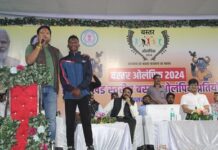NEW DELHI: Army Chief General Bipin Rawat’s remark defending Major Leetul Gogoi is a bit intriguing. It raises some questions that beg answers.
One, he says with little ambiguity that India is at war in Kashmir. It’s a dirty war, a proxy war, but it’s still war. It’s something the current political dispensation would be cagey about admitting, going for euphemisms to dilute the gravitas of the word. But trust the Army chief to call a spade a spade. Now the questions: How long has the Army been into the war? Is it since the killing of Burhan Wani, Hijbul commander, in July last year?
Two, who’s the enemy? Is it the stone-pelters? General Rawat makes it obvious.
“People are throwing stones at us. People are throwing petrol bombs at us. If my men ask me what do we do, should I say, just wait and die? I will come with a nice coffin with a national flag and I will send your bodies home with honour. Is it what I am supposed to tell them as chief?” he said. Again, as chief of the armed forces he makes the correct statement. He cannot be sympathetic to people attacking his men. But why should the elite force be engaging with stone-pelters, apparently flash mobs without a leader?
His frustration was evident when he said: “In fact, I wish these people, instead of throwing stones at us, were firing weapons at us. Then I would have been happy. Then I could do what I want to do.”If the separatist leaders are behind those hurling stones at army personnel — this is what the mainstream media and a big section of the supporters of the government would have us believe — why not go after then directly? They should be behind bars on sedition charges, not roaming free, instigating youth to wage war against India. It would be a definite tactical move forward, the inflection point in the country’s approach to Kashmir. A decision in this regard has to come from the political establishment in Delhi. It would spare the Army from getting into an embarrassing war where it cannot even open fire at the enemy.
Why is Delhi playing coy, leaving the Army in a bizarre situation? General Rawat said the adversaries as well as people should be afraid of the Army. Fine, but when people realise your hands are tied they will lose all fear. Perhaps that’s one major reason why stone-pelting has not stopped in the Valley despite tough words from the Centre.
Three, the army chief said dirty war calls for innovations and defended Major Gogoi’s use of a Kashmiri as a human shield. Now, can this be standard operating procedure in militancy-affected states? Obviously not. The Army cannot keep tying up perceived enemies to vehicles to ward off attackers as a routine practice. It not only has human rights repercussions but also can damage the moral authority of the Army, which it can ill-afford.
So was there really a necessity for the Army chief to defend Gogoi’s action openly? His remark virtually gave the aura of legitimacy to something that should have been treated with as little fuss as possible. The danger in it is that the blood hounds in the entire country would expect and demand more of such action from the Army. It would only aggravate the existing bad situation in Valley, making it difficult for both government and the defence forces to work towards a solution different from the muscular one.
The Army can do without effusive praise from the intemperate civilian world. As a professional force it has done enough, including winning wars and providing service during calamities, to command respect in the country. If General Rawat’s remark was aimed at conveying a message to the country about the Army’s position in the Valley, it was not required.
What Kashmir requires at this point is a political solution. The government should be explaining to the country whether the Army must be in an uncomfortable situation like this and for how long.















